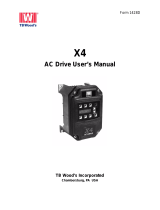4 · VACON® arfiff03 Grid Converter
Local contacts: http://drives.danfoss.com/danfoss-drives/local-contacts/
4.2.5.2 Statuses .................................................................................................................... 43
4.2.6 Activation status ......................................................................................................... 44
4.2.7 Line Monitoring .......................................................................................................... 45
4.2.8 Active Limits ............................................................................................................... 45
4.2.9 PI Power Controller ................................................................................................... 45
5. Parameter list ............................................................................................................... 46
5.1 Basic parameters ................................................................................................................... 46
5.2 Reference handling ................................................................................................................ 46
5.2.1 DC Reference ............................................................................................................. 47
5.2.2 Power / Frequency reference ................................................................................... 47
5.2.3 PID Power Controller for AFE ................................................................................... 47
5.2.4 Reference adjust ........................................................................................................ 48
5.2.5 AC voltage reference ................................................................................................. 49
5.3 Ramp control .......................................................................................................................... 49
5.4 Input signals ........................................................................................................................... 49
5.4.1 Basic settings ............................................................................................................. 49
5.4.2 Digital inputs .............................................................................................................. 50
5.4.3 Analogue input 1 ........................................................................................................ 51
5.4.4 Analogue input 2 ........................................................................................................ 51
5.4.5 Analogue input 3 ........................................................................................................ 51
5.4.6 Analogue input 4 ........................................................................................................ 52
5.5 Output signals ......................................................................................................................... 52
5.5.1 Digital output signals ................................................................................................. 52
5.5.2 Delayed DO 1 .............................................................................................................. 53
5.5.3 Delayed DO 2 .............................................................................................................. 53
5.5.4 Analogue output 1 ...................................................................................................... 54
5.5.5 Analogue output 2 ...................................................................................................... 55
5.5.6 Analogue output 3 ...................................................................................................... 56
5.5.7 Options ........................................................................................................................ 56
5.6 Limit settings .......................................................................................................................... 57
5.6.1 Current limit ............................................................................................................... 57
5.6.2 Power limit ................................................................................................................. 57
5.6.3 Frequency limit .......................................................................................................... 57
5.6.4 Micro Grid ................................................................................................................... 57
5.6.5 DC voltage ................................................................................................................... 58
5.7 Drive control ........................................................................................................................... 58
5.7.1 AFE control ................................................................................................................. 58
5.8 Master/Follower ..................................................................................................................... 58
5.9 Protections .............................................................................................................................. 59
5.9.1 General ....................................................................................................................... 59
5.9.2 Temperature Sensor Protections ............................................................................. 60
5.9.3 Earth fault ................................................................................................................... 60
5.9.4 Fieldbus fault .............................................................................................................. 60
5.9.5 External fault .............................................................................................................. 61
5.9.6 Grid voltage D7 ........................................................................................................... 61
5.9.7 Grid frequency ............................................................................................................ 61





















